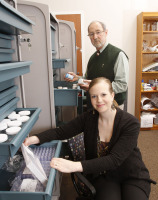What is a Pharmacy Technician?
A Certified Pharmacy Technician (CPhT) plays an important role in pharmacy operations. During the course of their day, a pharmacy tech will work closely with other members of the pharmacy staff, as well as the general public. Explore the details of this essential healthcare career below.
Explore This Page
A Certified Pharmacy Technician (sometimes noted as CPhT or less often, PhT) is a healthcare professional who dispenses medication and medical devices to patients, working under the direct supervision of a licensed pharmacist.
Healthcare providers and retail customers alike count on the attention to detail and thoroughness that is required for this position. This profession entails more than preparing prescriptions, and actually may have more avenues for advancement than many suspect.
CPhT’s provide customer service within the pharmacy, help clients at the register, work with referring physicians’ offices and insurance companies, and perform a variety of administrative duties. They are not able to provide advice, direction, or act in a consultative manner regarding the medications that are prescribed. Those aspects of the dispensary process are the responsibility of a licensed pharmacist.
Pharmacy Technician At A Glance
- Degree Level Requirements: Program Certificate, typically less than 1 year of classwork & internship.
- Licensure Requirements: Licensing requirements vary by state, visit our state resource pages for state specific information.
- Specializations: Certification available in: Sterile product preparation, Chemotherapy, Extemperaneous pharmaceutical compounding
- Median Annual Salaries: $33,950 *
- Job Outlook: 4% increase from 2019 to 2029 **
Job Description
A pharmacy tech fulfills a variety of duties in a pharmaceutical location. They may receive incoming prescriptions, fill and dispense medications, prepare labels, and take payment for filled prescriptions.
To the individual filling their prescription, the pharmacy tech is often the first person they speak with, and as such must have good customer service skills. In an industry where mistakes can have dire consequences, attention to detail is critical. They may also perform a variety of clerical duties in their workplace, such as working with physicians’ offices, insurance companies, and pharmaceutical companies and representatives.
Within a typical pharmacy setting, a Pharmacy Tech is give more responsibilities and requires more training than other support staff positions.
Education & Licensure Requirements
According to a survey conducted by the National Association of Boards of Pharmacy, over 80% of jurisdictions license, register, or require certification of pharmacy technicians.
Pharmacy technicians are hands-on with clients and patients, and have access to confidential medical records. The work they do can directly affect the health and well-being of their clientele, and even though all work must be directly supervised by a licensed pharmacist, it is critical that the Pharmacy Techs be as educated and trained as possible.
The sensitive nature of the work they do, and the access to controlled substances that they have, means it is in the best interest of the technician, the pharmacy, the client or patient, and the state that regulatory requirements exist.
While not all states have such requirements, it will benefit any job applicant to obtain at the very minimum certification in their field.
Education
The majority of pharmacy techs complete a pharmacy technician program, either at a community or technical college, or by attending a training program offered by a retail pharmacy. The National Association of Boards of Pharmacy (NABP) recommends that all certified pharmacy technicians be required to complete an accredited pharmacy technician education and training program.
Training
Most employers will do on the job training with new hires, but any training that an applicant can bring to the job can help increase the likelihood of finding employment. Training for new pharmacy techs often comes in the form of a successful internship completed in the final quarter or semester of school. Networking during that internship is a great way to find employment opportunities, so take advantage of this time by performing at your best at all times.
Certification/Licensure
Most states require their PhT’s to be certified or licensed. Certification primarily comes from two different agencies: The National Healthcareer Association (NHA), and the Pharmacy Technician Certification Board (PTCB).
Both agencies are nationally recognized and accredited, and their certification is valid in all 50 states. To find out if your state requires licensure, visit the state’s Board of Pharmacy website, or our certification page for more information.
Career Expansion Opportunities
There are ways in which you can further your career opportunities, whether through ongoing training or education or by considering employers that you may not have thought of.
- Specialty Pharmacy Technicians: New specialty drugs are bringing opportunities to the technician.
- Pharmacy Specialist for the Military: Unique circumstances and duties for the enlisted specialist.
- Certified Fitter of Therapeutic Shoes: Further your skillset and employment options with specialized training.
- Pharmacy Technician Management: Pursue a career in management.
Employment Outlook
Jobs for pharmacy techs are expected to increase at a rate of 4% spanning the decade from 2019 to 2029, according to the U.S. Bureau of Labor Statistics.
Work Setting
Approximately 75% of pharmacy techs work in a retail setting, such as a grocery store, drug store, or online. With this type of employer, good customer service skills are very important as there is a great deal of interaction between the pharmacy tech and the client.
Others work in hospital settings, nursing homes, or even the Federal Government. In a hospital or nursing home, the duties of the pharmacy tech might differ from that of a retail outlet. The administration of patient charts, delivering of medication, or the assembly of medication packets for nurses to administer might be part of the job description. No matter the duties, though, work is always checked and signed off by a licensed pharmacist.
Compare Careers In Pharmacy
| Pharmacy Aide |
|
|---|---|
| Pharmacy Tech |
|
| Pharmacist |
|
The idea of launching a new career can be intimidating. Whether you’re new to the job market or are thinking of making a change, you’ve undoubtedly got questions. Our guide to becoming a pharmacy technician will help you explore the field by presenting you with the educational requirements to enter the profession, the certification and licensing necessary for each state, and what you can expect to earn, all of which are introduced below. Please let us know if you have any questions or feedback. Enjoy!
Pharmacy Technicians play a vital role in our healthcare. They work directly under a licensed pharmacist, helping to prepare and dispense prescription medication. As the number of prescribed medications grows, due in part to an aging population and continuing medical advancements, employment for pharmacy techs is expected “to grow 4 percent from 2019 to 2029, about as fast as the average for all occupations,” according to the most recent BLS survey. By 2029 they project that the United States will employ over 437,000 Pharmacy Technicians.
Additional Information and Resources
- * Salary Data Provided by https://www.bls.gov/oes/current/oes292052.htm
- https://www.bls.gov/oes/current/oes319095.htm
- ** Job Growth Data Provided by https://www.bls.gov/ooh/healthcare/pharmacy-technicians.htm#tab-6




